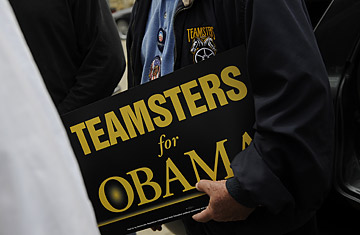
Perhaps it was his background as a community organizer helping laid-off steel workers find work, or his promises to close the book on discredited trickle-down economics and renegotiate unfair trade deals. Few groups were as happy about the election of Barack Obama as organized labor, which felt it finally had a champion after more than three decades of being marginalized.
But in the seven weeks since Obama's victory, the President-elect has proven to be more of a pragmatist than labor envisioned. From his podium in Chicago during the debate over whether to bail out the Big Three automakers, Obama has been critical of the United Auto Workers, arguing that the union must be willing to grant concessions on its workers' hard-fought wages and benefits. Labor has also been disappointed by some of Obama's initial appointments. Rep. Xavier Becerra of California turned down the job of U.S. Trade Representative because, he told a radio station, he felt overhauling trade agreements would not be a top priority of the incoming Obama administration. Obama's eventual pick, former Dallas Mayor Ron Kirk, has a record of supporting free trade deals, anathema to labor. And some progressives were disappointed that Obama passed over labor activist Mary Beth Maxwell and instead chose Rep. Hilda Solis of California as Secretary of Labor. "Labor has every good reason to be wary since they've been disappointed by Dems before, such as Presidents Clinton and Carter," says Robert Borosage, co-director of the progressive advocacy group Campaign for America's Future. (See Obama's cabinet picks .)
There is no doubt that an Obama presidency will mark a suspension of the assault on unionization that started under Ronald Reagan and peaked under George W. Bush. Obama is sure to appoint labor-friendly members to the National Labor Relations Board and begin to undo many of the obstacles Bush constructed. But the big question is how hard he will push for the measure at the top of labor leaders' wish list: the Employee Free Choice Act [EFCA]. During the campaign Obama expressed support for the bill, which would attempt to facilitate union organizing by doing away with secret ballot votes. But he may not be willing to expend political capital on the bill early on, especially given the precarious state of the economy. (See pictures of Obama's college years.)
The problem, from labor's point of view, is that Obama needs the business community's support to pass his first priority: a massive economic recovery package, as much as $850 billion in infrastructure projects and middle class tax cuts. And if there's one item atop the business community's agenda this year, it is to defeat EFCA — also known as card check, since it would replace secret ballots with cards. "The Obama administration wants to pass the stimulus and they need the business community to do that," says Randy Johnson, vice president for labor issues at the U.S. Chamber of Commerce, which represents three million U.S. businesses. "Trying to pass card check would be like declaring a nuclear war with the business community. It'd be Armageddon."
See pictures of Barack Obama's nation of hope.
See TIME's Person of the Year, People Who Mattered, and more.
